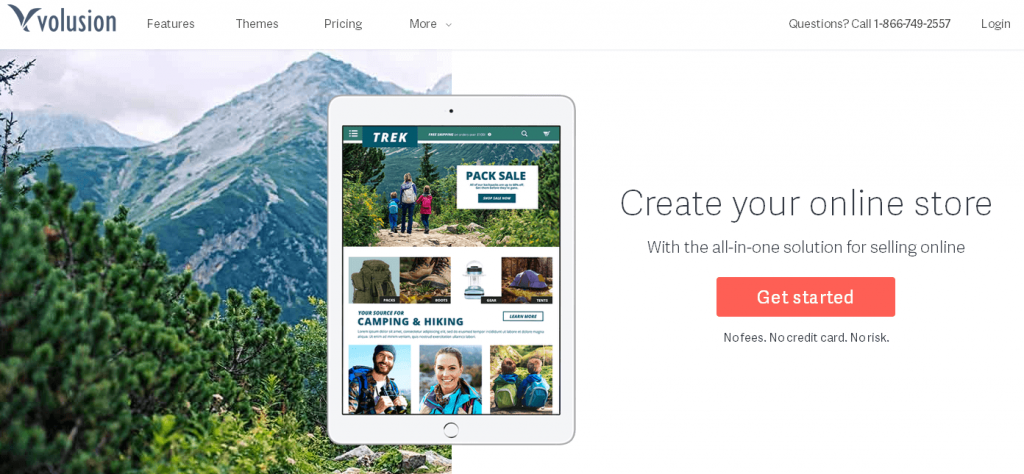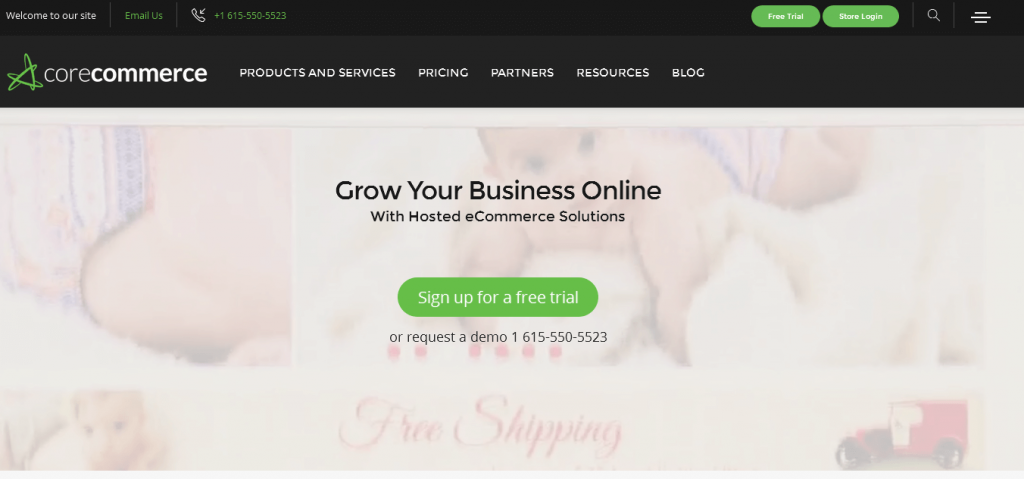Do you want to start an eCommerce website and are worried about the technology part? Starting an online store is becoming very simple and hassle-free nowadays. In this article, you will learn how you can also create your own eCommerce website without investing in technology. And this has happened because of ready-to-use hosted eCommerce platforms.
We will share a detailed review of the best eCommerce platforms providing ready-to-go eCommerce hosted technology which includes eCommerce software, inventory management, invoicing, order management, plugins, payment gateway, analytics tools, multiple platform connections, and all necessary features to start your eCommerce business in few minutes.
Glance back just a couple of years and it won’t be a hard guess that the retail businesses have had some major transformations. Modern-day retailers have already realized that digital experiences have completely reshaped the way of doing business. By the end of 2020, e-commerce or online retail is projected to grow to 4.206 trillion mark US dollars 2020 worldwide and in the next couple of years, it will hold the title of becoming the most valuable and fastest-growing industry.

Today, more than 71% of retail shopping happens online through eCommerce vendors. The reasons are many and include better deals, comparative pricing, more varieties to choose from, easy payment, doorstep delivery, and much more. It thus doesn’t come as a surprise when even physical stores are looking for a digital presence.
Going online widens your market exponentially and selling online opportunities are endless. Further, you don’t necessarily have to host your own store for starters. After seeing the growth of this industry many people are willing to start their own e-commerce businesses. There are incredible eCommerce marketplaces like eBay, Craigslist, Flipkart, and Amazon that let you do the selling and reach out to the millennia. With eBay for instance, you can choose to sell just about anything. It could be collectibles, toys, electronics, paintings, apparel, cosmetics, and just about anything.
Selling on platforms like eBay in addition to your physical store also gives you more opportunities and a market that surpasses geographical boundaries. Selling on eBay is also a very easy process and would be just like interacting with the customer, with eBay managing the deal. More serious and established retailers, with a vast product line, can also look to come up with their own dedicated platforms.
But, there are some limitations when you are selling your products on third-party marketplaces like eBay too. We will definitely write separate articles to discuss those third-party marketplaces but here, we will emphases on having your own eCommerce website. It will not just give you full control over how you manage your website to become an e-commerce entrepreneur but will give you the benefits of returning customers who can directly place orders on your website without paying referral fees.
What is an E-commerce Platform?
An eCommerce platform is a comprehensive software platform that allows vendors or sellers to manage their business digitally. Users can manage digital sales and inventory, insert or delete products, make payments, calculate complex tax, etc., through one central software efficiently simplifying online store management.
Points to Consider While Choosing the Right Ecommerce Platform
Businesses generally don’t perform very well digitally because of not selecting the appropriate e-commerce platform. Business owners often lack an in-depth understanding of their goals and make mistakes of worst implementation and the ROI is trending down. Nowadays retailers should choose the right technology to overcome this situation. They should keep in mind the points below to select the best e-commerce platform for their business.
- On-going Cost: These are the costs to run an eCommerce platform, which include expenses of design, SSL certificate cost, store annual cost, hosting and ongoing annual cost.
- Security: E-commerce security from the customer and business points of view ensures safe electronic transactions through the internet.
- Customer Support: E-commerce platforms should provide support to online customers and shoppers when they ask questions.
- Flexibility: E-commerce platforms need to be flexible and fast to improvise the user experience.
- Stability: Because E-commerce getting increasingly competitive, performance and stability play a crucial role while choosing the right platform.
- Automation of business functions: Automation using advanced software tools and plugins will help users to complete complex tasks rather than finishing to do themselves.
Here are 8 Popular eCommerce Platforms to Start With
As there are 100s of hosted eCommerce platforms available in the market and all are offering custom solutions by considering different target audiences and target markets. Here we shortlisted the 8 best platforms by considering their overall popularity and global acceptance. This list will be updated on regular bases.
1. BigCommerce

With more than 153468 stores, BigCommerce is one of the most reputed eCommerce software platforms when it comes to online store deployment. Again, BigCommerce technology is being used by both small and larger stores to increase traffic. The unique advantages of BigCommerce include:
- A comprehensive drag-and-drop functionality and ‘out-of-the-box’ toolkit to build your online presence
- Integration of social channels to leverage your sales
- Hundreds of apps to add more advanced store functionalities right from filters to checkout
- A 24x7x365 support, especially if you need help at 3 o’clock in the morning!
- BigCommerce platform offers great features to connect various platforms like eBay, Amazon, Facebook, Instagram, etc.
- Offers over 250+ local currencies support to target local customers without worrying about payment conversions
- They offer a responsive framework that can help you to improve mobile conversions of the store
| Advantages | Disadvantages |
| Providing an open SaaS platform for customization | No native POS system |
| A large number of in-built features | Not easy to learn for beginners |
| No transaction fees | |
| Best API as per industry standard |
BigCommerce Pricing:

BigCommerce pricing starts at just $29.95/month to $249.95/month, depending on the features you would want to use. They are also offering Enterprise solutions at custom pricing which is lower than Magento and Shopify plus (this is what they are claiming).
2. Shopify – Best Ecommerce Platform for Small Business

Shopify is one of the first names you must have stumbled upon when searching for e-commerce platforms to host your online store. It is perfect for both small businesses and larger retail brands selling millions of dollars worth of products. The key advantages of Shopify include:
- Hundreds of professional, beautiful, and mobile-ready themes for a great-looking store
- More than 1500 apps that increase the functionality of your online store
- 24×7 support across the year
- Pre-approved experts if you are looking to hire help with your store designs and functions
- You don’t require any knowledge of coding!
There is no doubt why Shopify is the number one choice to create an e-commerce store. By the end of 2015 total of 2.43 L stores has been created on Shopify and they made $14.3 Billion from sales.
| Advantages | Disadvantages |
| Unlimited storage with unlimited products | Difficulty with content marketing |
| No loading time issues | You have to pay charges for service on every sale transaction |
| Customizable themes for a wide range of business | No email hosting |
| In-built blog CMS | |
| Large app store | |
| Multiple payment processors | |
| Hosting and security |
Pricing: Shopify plans start at just $29/month and you can move on to the $299 for the advanced plans with more features.
If you are an enterprise business and looking for a large-scale solution, you can also go with Shopify plus to meet your ever-growing requirement.
Shopify store offers great platforms for developers to deploy custom Shopify apps to improve your store performance with enhanced experiences. Here you can use that app as per your requirement.
Also, Read – These 8 Online Business Review Websites Can Boost Your eCommerce Business
3. Volusion – Best Ecommerce Platform for Startups

Volusion might not be as easy as Shopify, but if you have an understanding of e-commerce portals, this is worth it. One disadvantage with Volusion however is that you need to have a basic idea of coding. Volusion is catering to a range of retail businesses including electronics, apparel, automotive, jewelry, beauty & health, food & beverages, and more. The key features include:
- About 100 apps that let you integrate useful and comprehensive e-commerce tools in your store
- 24×7 support over the phone, live chat, and email
- Zero transaction fee. This means you keep all the profit!
| Advantages | Disadvantages |
| Professional approach to the service | Pricing |
| User-friendly dashboard | Limited features |
| Excellent customer support | Payment gateway limited |
| Fast and secure | |
| Variety of templates | |
| No transaction fees | |
Pricing: Pricing of Volusion is at par with Shopify, ranging between $15/month and $135/month. However, getting to keep all your profits makes it an exciting choice.
Also Read – How to Set Up a Free Square Online Store in 8 Simple Steps
4. Big Cartel – Best Open Source Ecommerce Platform

Big Cartel is more popular and well-known among individual sellers who are looking to sell less than 5 products (Free Forever). It is also being used by sellers with bigger businesses and establishments. However, it is recommended for sellers who have less than 300 products to sell (this would also be the limit with the platform). The key features include:
- Build an independent store with an easy website builder
- Basic features that allow the buying and selling process
- Mobile-friendly and responsive stores
- SEO, order management, promotion marketing tools
- Real-time feedback with data and statistics
| Advantages | Disadvantages |
| Easy to use | Limited amount of products for sale |
| Free templates | No 2FA authentication |
| Cheap | Poor technical SEO features |
| Customer support is only available in English via email. |
Pricing: Big Cartel offers four plans. The Gold membership is free and allows for 5 products. The Platinum membership costs $9.99/month and allows for 25 products. The Diamond membership costs $19.99 and allows for 100 products. Lastly, the Titanium membership costs $29.99/month and allows for 300 products.
5. Shift4Shop

Shift4Shop (previously known as 3DCart) offers the usual standard features along with special capabilities like drop shipping support, an affiliate marketing program, and a couple more. Shift 4 shop provides 24/7 free tech support even if you are using the free trial. After signing up on Shift4Shop you will also get hundreds of free and premium template designs to set up your store.
- Easy customization
- Built-in Facebook store to sell on Facebook
- Search engine optimization friendly (Custom URLs, Dynamic meta-tags)
- Real-time shipping information
| Advantages | Disadvantages |
| In-built features | Inconsistent customer support |
| Free website platforms |
Pricing: The plans of Shift4Shop hosting range between $29/month to $229/month – at par with Shopify
6. CoreCommerce – Best B2B Ecommerce Platform

CoreCommerce is perfectly suited to sellers looking at international markets. This is ensured by outstanding multilingual support and a range of payment gateway integration. Apart from this, CoreCommerce offers a range of free and responsive templates to work with along with third-party apps that add more power to your store.
| Advantages | Disadvantages |
| Excellent technical support | Difficult to sort out fraud orders |
| Multiple payment options | |
| Selling globally |
Pricing: CoreCommerce pricing ranges between $39.99/month and $199.99/month
7. SquareSpace – Best Ecommerce Software
SquareSpace is especially recommended for individual sellers, especially artists, bloggers, photographers, musicians, etc. it’s not the traditional generic business but does offer an incredible variety of responsive templates to work with.
| Advantages | Disadvantages |
| G-suite Integration | No free plans are available |
| Excellent customer support | Limited amount of SEO customization options |
| E-Commerce friendly | |
| Data import and export facility | |
| Mobile friendly |
Pricing: SquareSpace has 2 pricing – $26/month (Basic) and $46/month (Advance)
8. LemonStand

LemonStand offers unique flexibility in designing and automation your own online store. It has in-face-hosted stores that have won tradeshow awards and startups that have generated more than $400,000 in pre-sales! Young and energetic, LemonStand is a new-age competitor of Shopify and is worth a try.
| Advantages | Disadvantages |
| No transaction fees | You must require technical skills to manage |
| Advanced features of SEO | Limited integrations |
| Easy to use | |
| Excellent security and support | |
Pricing:

Conclusion:
If you don’t want to get into the technical part of managing an eCommerce business, the e-commerce software platform solutions mentioned above can be your best choice. You can get more time in managing your core expertise like catalog, inventory, product promotion, and shipping to run your eCommerce business smoothly.
If you think we missed any wonderful eCommerce platform to include in the list, we would love to hear your views.
Please check below the best eCommerce Platforms of 2022:
1) BigCommerce
2) Shopify
3) Volusion
4) Big Cartel
5) Shift4Shop
6) CoreCommerce
7) SquareSpace
8) LemonStand
An eCommerce platform is a comprehensive software platform that allows vendors or sellers to manage their business digitally.


